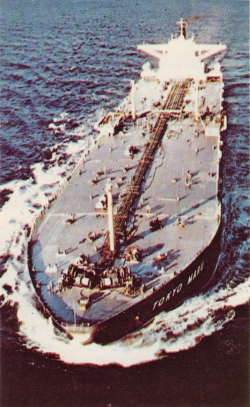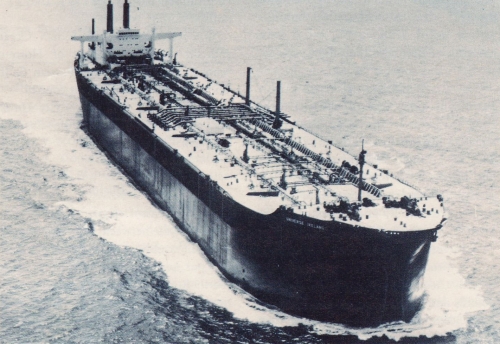Action in the North
In the North, European troops have struck Lebanon and Syria to reopen those vital pipelines. Next object is a twofold drive across Jordan/Iraq and into Turkey to capture the Dardanelles and blockade Russian naval forces in the Black Sea.
But the Soviet Union has already moved troops into Turkey, Iran and eastern Iraq. Massive concentrations of Soviet troops and military equipment are poised on the Euphrates river.
They spearhead across Iraq and Jordan bringing European and Russian troops face to face along the Jordan River.
Russia — fearful of an attack into her European heartland to the north — remembering the days of Frederick the Great, Napoleon, and Hitler — strikes first, showering Western Europe's industrial centers with missiles carrying nuclear warheads. In the Far East, along the Amur River border between China and the Soviet Union, a mini-nuclear war is already in progress. World War III is on in full fury.
An impossible scenario? We shouldn't be too sure. The stakes are high. Middle East and North African oil is presently the lifeblood of Europe and Japan. Neither can exist without it.
A Possible Arab Reaction
Neither should we assume that the Arab nations will necessarily act in their best economic interest. It is true that oil provides Middle Eastern governments with an overwhelming amount of their revenues. About 95 percent of Kuwait's, 79 percent of Libya's, 77 percent of Saudi Arabia's, 56 percent of Iraq's and 50 percent of Iran's revenues come from oil.
But these nations do not always act rationally from a business point of view. Iran, Moslem but not Arab, shut down its oil installations to its own detriment in 1951.
Two decades later, during January 1971, painful negotiations were in process in Teheran, Iran between a score of oil companies and the ten OPEC (Organization of Petroleum Exporting Companies) nations.
During a press conference in late January, the Shah of Iran, normally a moderate, urged all ten OPEC members to take concerted action and halt oil exports should the companies fail to come to reasonable terms.
"If that happens," said an executive of a U.S. oil giant, "there would be complete and utter chaos in Europe and Japan." Fortunately, the oil companies came to terms.
The oil producer nations are not the only ones having a dangerous leverage. The transit countries can also wield a blackmail stick. And they have less to lose.
Egypt, for example, is basically a transit country. Its "pipeline" — the Suez Canal — has been shut down since the Six-Day War in 1967. Consider what has been the consequence.
By the end of 1970, oil freight rates from the Persian Gulf to Europe were more than SIX TIMES what they were in early 1967.
With this calamity, plus a closed Trans-Arabian pipeline (severed "accidentally" by a Syrian farm tractor May 3, 1969), and an inadequate tanker fleet, both the prosperity and national security of Western Europe were threatened.
There has been, as a result, a gradual but detectable shift in European policy on the Arab-Israel confrontation. Europe has been mustering a mounting determination to get some kind of settlement in the area to free the flow of oil through Suez.
A New Oil Tactic
Meanwhile, Egypt has come up with a new ploy. Its idea is to have Middle East and North African oil producers simply refuse to expand present output. This would maintain a high level of income for oil producing nations but would create an acute oil shortage in a Western Europe geared to an ever-increasing rate of consumption.
With a European rate of increase at one million barrels per day — or a 12 percent increase yearly — Europe cannot put up with the kind of nonsense advocated by the Egyptians.
But at the present time "Egypt" is not simply the political boundary we know as the nation of Egypt. It is a federation of several nations. Recently, the presidents of Egypt, Libya, and Syria formed a "Union of Arab Republics," binding their countries into a federal union with one president and a common military policy. The new state will be established after national referendums on September 1, 1971. It will be open to other Arab countries. Sudan will probably join later. Everyone, of course, realizes that Arabs are prone to fall out with each other. The signing of the confederation in Benghazi, Libya came on the eighth anniversary of a similar pact signed by Egypt, Syria and Iraq. It was dissolved a month later.
 |
The mammoth
Tokyo Maru,
one of the new breed
of supertankers built
to carry oil from the
Middle East
to Japan.
Photo
Ishikawajima Harima
|
The Power of a Federation
In 1958, Egypt and Syria federated as the United Arab Republic with a common flag. Yemen joined later. It was dissolved in 1961. Three years later Iraq, Egypt, Kuwait, Jordan and Syria announced the formation of an Arab Common Market. It never came to pass.
Nevertheless, this is no assurance that the present union will also break up. And consider what the Union of Arab Republics could do to oil shipments if it wanted to.
Libya produces 3.4 million barrels of oil today. As mentioned, it is a major supplier of oil. Libya could also put pressure on Algeria to impede oil flow. Meanwhile, the Suez Canal is closed. Also, a new pipeline is being constructed from the Red Sea to the Mediterranean. It will accommodate supertankers at both ends.
At the same time Syria sits astride pipelines carrying Saudi Arabian and Iraqi oil to the Mediterranean.
By simultaneous agreement, oil-producing countries could put the squeeze on oil to Europe. The real situation does not fall far short of the possibilities mentioned in the scenario earlier.
It is little wonder that the United States has recognized the Middle East to be of prime strategic importance from its oil deposits alone. The landing of American troops in Lebanon in 1958 and the British troop landings in Kuwait in 1961 both had the smell of oil about them.
|
Arrows show percentage of oil consumption derived from Middle Eastern and North African oil.
 |
|
Keystone Press Photo
 |
|
The Japanese built 312,000 ton tanker
Universe Ireland plies the ocean. Six more tankers
of the same size have been ordered by the
Gulf Oil Company to shuttle between Kuwait
and Bantry Bay, Ireland.
|
The American sponsored CENTO (Central Treaty Organization) has had as its objective the protection of U.S. dominated oil producing areas of the Middle East.
Basically the pact has been a fizzle. Only Iran joined, of the oil producers. The pact also bound Turkey and Pakistan. (Previously it was called the Baghdad Pact but in 1958 Iraq dropped out)
In the light of oil's strategic importance, some planners feel United States support for Israel is the most tension-producing element in Middle East politics. It makes American oil interests a tempting target for the Arabs should major hostilities with Israel resume. Europeans also have a difficult time balancing support for Israel and their utter dependence on Arab oil. For their part, the Arabs simply do not understand why the oil companies seem to have no influence on U.S. foreign policy in the area. Because, after all, oil is big business and it is basically American.